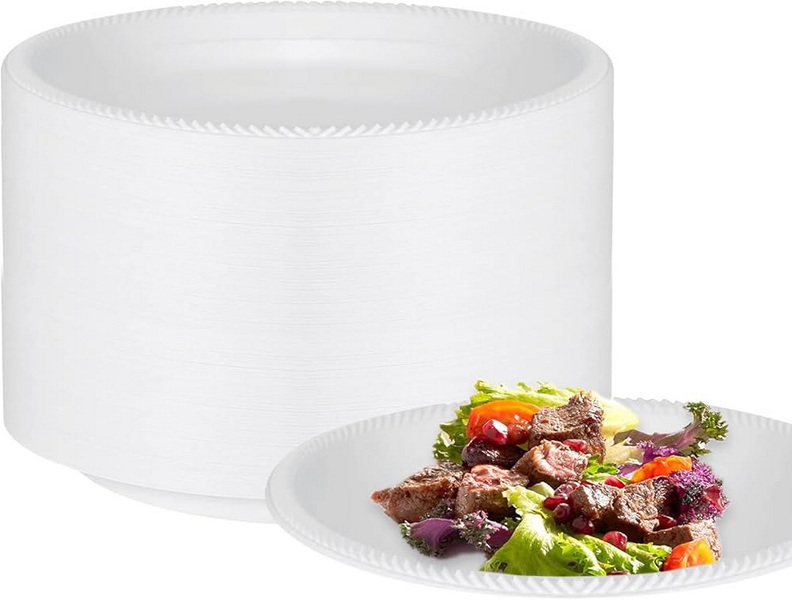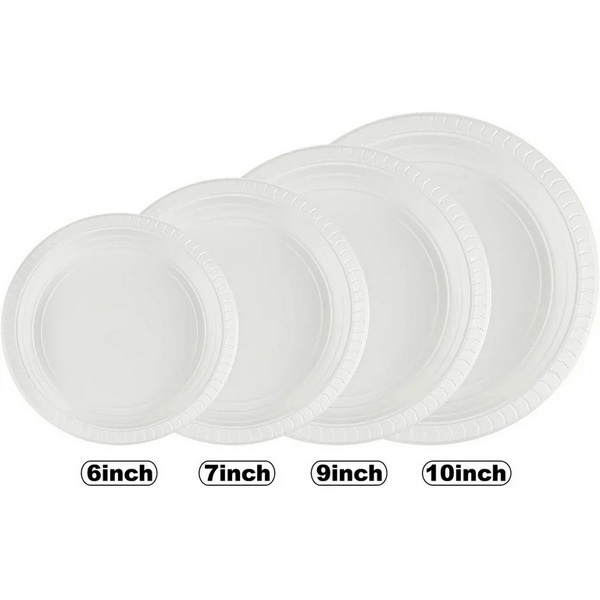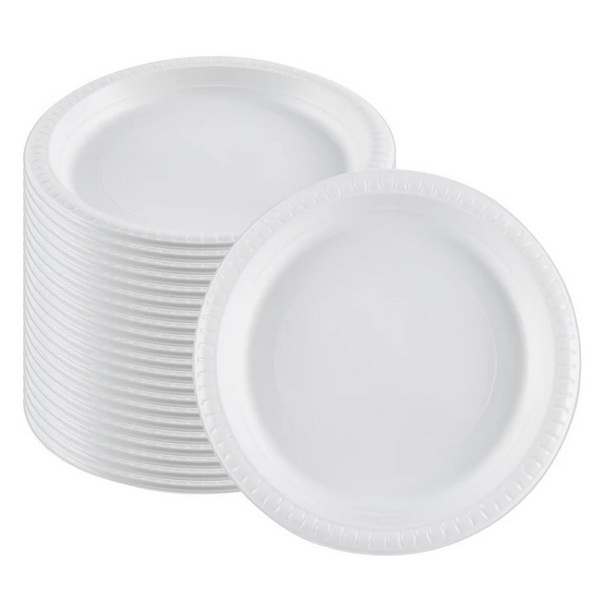
Content Menu
● Understanding Disposable Plastic Plates
>> Types of Plastics Used in Disposable Plates
● Are Disposable Plastic Plates Dishwasher Safe?
● Recommended Cleaning Methods for Disposable Plastic Plates
● The Environmental Impact of Disposable Plastic Plates
>> Eco-Friendly Alternatives
● Practical Tips for Using Disposable Plastic Plates
● Conclusion
● FAQ
>> 1. Can I wash polystyrene disposable plates in the dishwasher?
>> 2. What types of disposable plates are dishwasher safe?
>> 3. How should I clean disposable plastic plates?
>> 4. Are there eco-friendly alternatives to disposable plastic plates?
>> 5. Can repeated washing affect the quality of reusable plastic plates?
Disposable plastic plates have become a staple in many households, especially during gatherings, parties, and events. Their convenience and affordability make them an attractive option for serving food without the hassle of washing dishes afterward. However, a common question arises: Are disposable plastic white plates dishwasher safe? This article will explore this topic in depth, examining the types of plastics used in disposable plates, their safety in dishwashers, alternative cleaning methods, and the environmental impact of disposable plastics.

Understanding Disposable Plastic Plates
Disposable plastic plates are typically made from various types of plastic, including polystyrene (often referred to as Styrofoam), polypropylene, and polyethylene. Each type of plastic has different properties that affect its durability and heat resistance.
Types of Plastics Used in Disposable Plates
- Polystyrene: Commonly used for cheap disposable plates, polystyrene is not heat-resistant. It can warp or melt when exposed to high temperatures, making it unsuitable for dishwashers.
- Polypropylene: This type of plastic is more durable and can withstand higher temperatures. Some polypropylene plates are labeled as dishwasher safe.
- Polyethylene: While generally more robust than polystyrene, polyethylene also lacks the heat resistance required for dishwasher use.
Are Disposable Plastic Plates Dishwasher Safe?
The short answer is that most disposable plastic plates are not dishwasher safe. Here's why:
1. Heat Sensitivity: Most disposable plates are made from materials like polystyrene that cannot withstand the high temperatures found in dishwashers. The hot water and steam can cause these plates to warp or melt.
2. Chemical Reactions: The detergents used in dishwashers can interact with the plastics, leading to discoloration or degradation of the material. This not only affects the appearance but can also pose health risks if harmful chemicals leach into food.
3. Structural Integrity: Even if a plate survives a wash cycle without visible damage, repeated exposure to heat can weaken its structure over time, making it less safe for future use.

Recommended Cleaning Methods for Disposable Plastic Plates
Given that most disposable plastic plates are not suitable for dishwashing, here are some recommended cleaning methods:
- Hand Washing: The safest way to clean disposable plastic plates is by hand washing them with warm soapy water. Use a soft sponge to avoid scratching the surface.
- Air Drying: After washing, allow the plates to air dry completely before stacking or storing them to prevent moisture buildup.
- Avoiding High Temperatures: If you must clean these plates after use, ensure that you do not expose them to boiling water or extreme temperatures that could cause warping.
The Environmental Impact of Disposable Plastic Plates
While disposable plastic plates offer convenience, they also contribute significantly to environmental pollution. Here are some key points regarding their impact:
- Plastic Waste: Millions of tons of plastic waste end up in landfills every year. Disposable plastic plates take hundreds of years to decompose, contributing to long-term environmental issues.
- Marine Pollution: Many disposable plastics find their way into oceans and waterways, harming marine life and ecosystems. Animals often ingest plastic debris or become entangled in it.
- Carbon Footprint: The production of disposable plastics involves fossil fuels and generates greenhouse gases. Transitioning to more sustainable alternatives can help reduce this carbon footprint.
Eco-Friendly Alternatives
As awareness of environmental issues grows, many consumers are seeking alternatives to traditional disposable plastic plates. Here are some eco-friendly options:
- Compostable Plates: Made from materials like bamboo or sugarcane bagasse, these plates break down naturally and do not contribute to landfill waste. They offer a similar convenience without the environmental impact associated with traditional plastics.
- Reusable Plastic Plates: Investing in durable, reusable plastic plates designed for multiple uses can reduce waste and save money in the long run. Look for BPA-free options that are safe for food contact.
- Biodegradable Options: Some manufacturers produce biodegradable disposable plates made from plant-based materials that decompose more quickly than traditional plastics.
Practical Tips for Using Disposable Plastic Plates
To maximize the utility of disposable plastic plates while minimizing risks and environmental impact, consider the following tips:
- Choose Quality Products: Not all disposable plates are created equal. Look for brands that specify their products as dishwasher safe or made from high-quality polypropylene.
- Limit Heat Exposure: If you plan on using these plates for hot foods, be cautious about dishes that may exceed the plate's temperature tolerance. Avoid placing boiling liquids directly onto them.
- Educate Guests: If you're hosting an event where disposable plates will be used, inform your guests about proper handling and cleaning methods to ensure safety and sustainability.
Conclusion
In conclusion, while disposable plastic white plates offer convenience for serving food at events and gatherings, they are generally not dishwasher safe due to their susceptibility to heat and chemical reactions with detergents. Hand washing is the preferred method for cleaning these items to ensure they remain safe for future use. As consumers become more environmentally conscious, exploring alternatives such as compostable or reusable plates may provide a more sustainable solution while reducing our ecological footprint.

FAQ
1. Can I wash polystyrene disposable plates in the dishwasher?
No, polystyrene is not heat-resistant and will likely warp or melt in the dishwasher.
2. What types of disposable plates are dishwasher safe?
Some polypropylene plates may be labeled as dishwasher safe; always check the manufacturer's guidelines before use.
3. How should I clean disposable plastic plates?
Hand wash them with warm soapy water and allow them to air dry completely.
4. Are there eco-friendly alternatives to disposable plastic plates?
Yes, compostable plates made from materials like bamboo or sugarcane are great alternatives.
5. Can repeated washing affect the quality of reusable plastic plates?
Yes, repeated exposure to heat can weaken reusable plastic plates over time; it's essential to follow care instructions provided by the manufacturer.

















